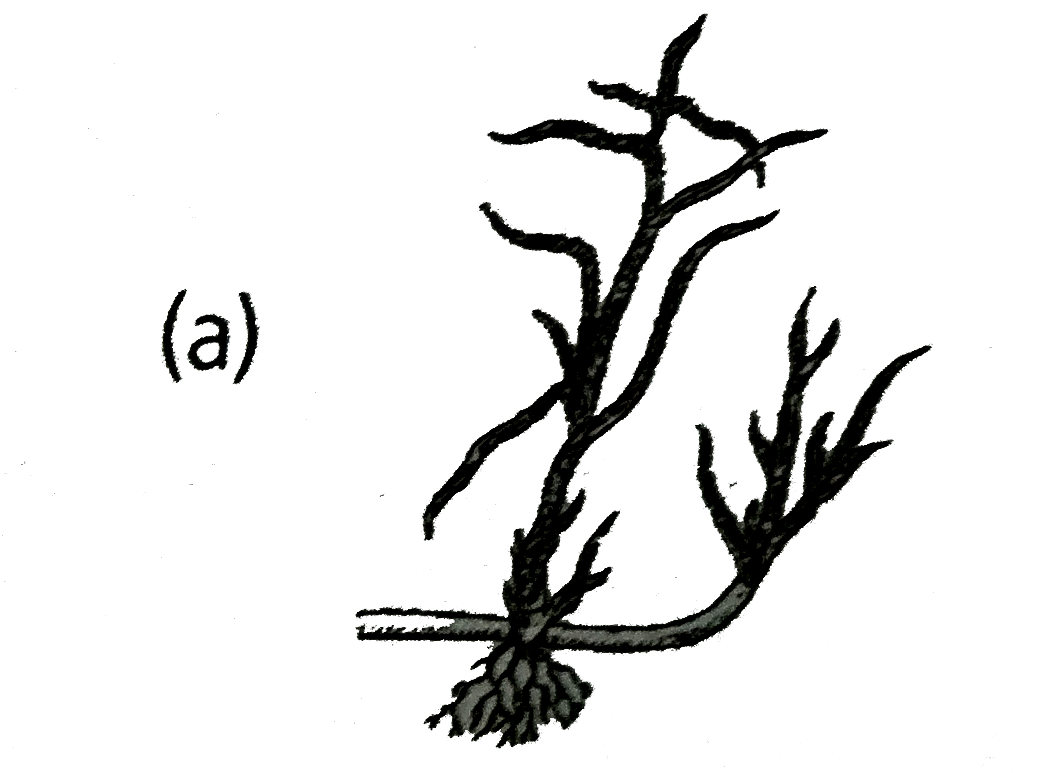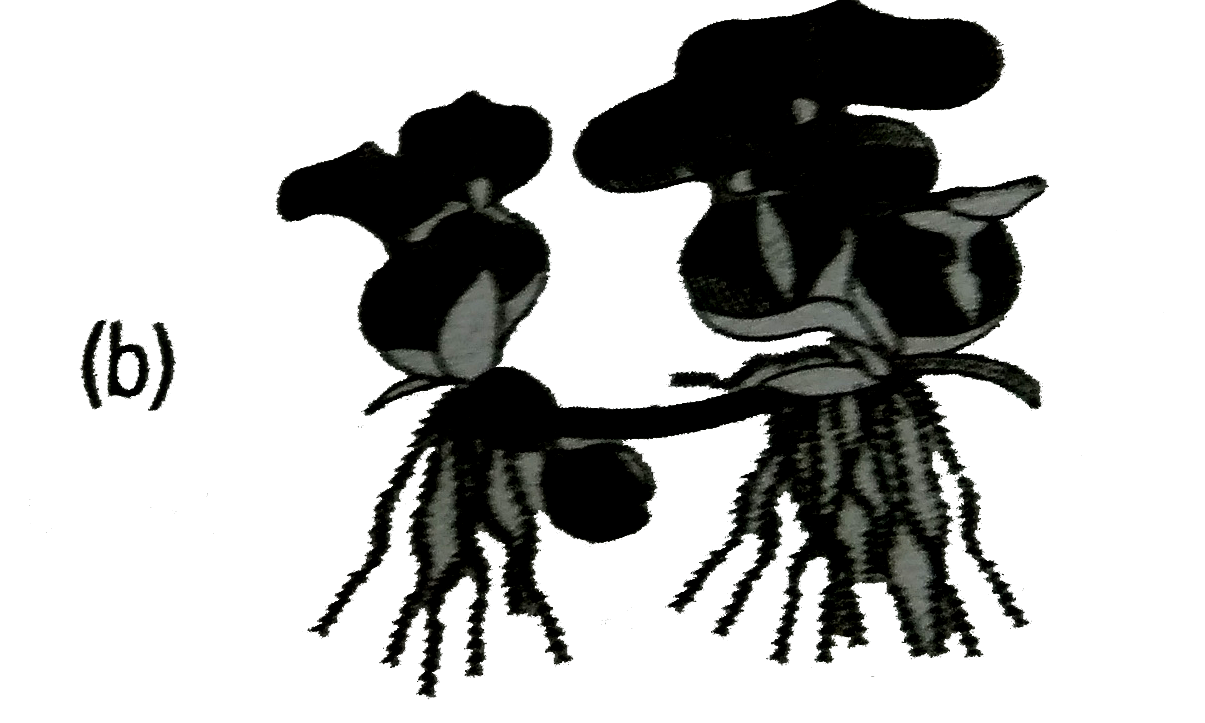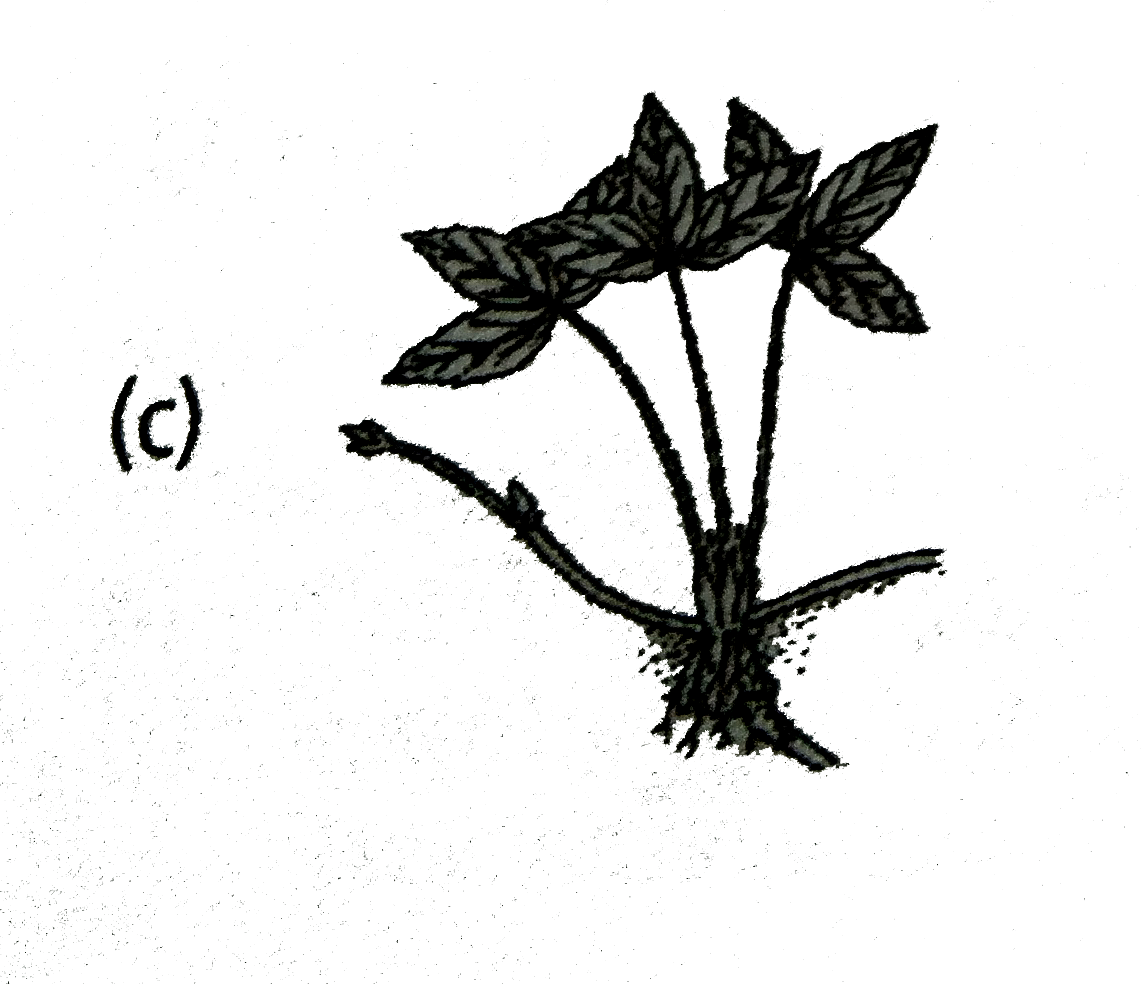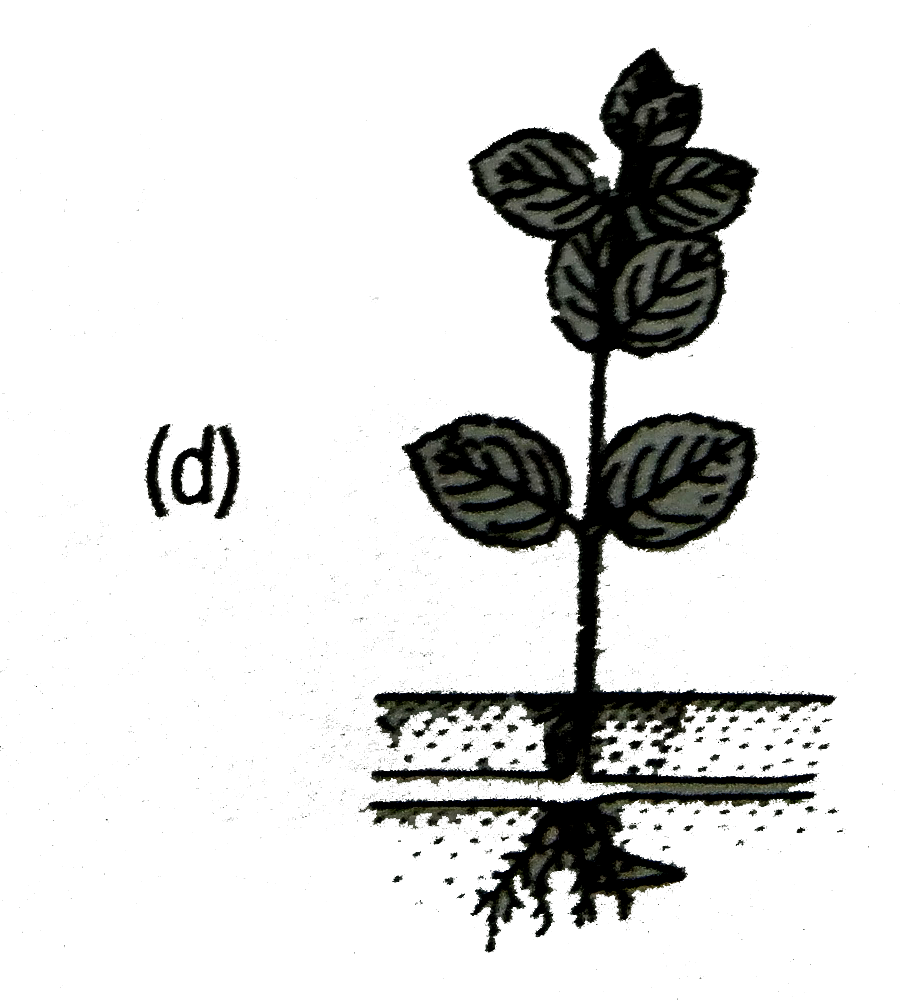This plant was introduced in India because of its beautiful flowers and shape of leaves but it became a notorious weed in Indain water bodies. Identify this plant.




The correct Answer is:b
Step-by-Step Solution:
1. Introduction of the Plant: The plant in question was introduced to India due to its aesthetic appeal, specifically its beautiful flowers and unique leaf shape.
2. Identification of the Plant: The plant is known as Eichhornia, commonly referred to as water hyacinth.
3. Historical Context: The introduction of Eichhornia to India is attributed to Lady Hastings, the wife of the first Governor General of India. She brought this plant as a gift because of its attractive purple flowers.
4. Reproductive Characteristics: Eichhornia reproduces vegetatively through a process called offsets. This means that it can produce new plants from lateral roots that grow horizontally, leading to rapid population growth.
5. Impact on Ecosystem: After its introduction, Eichhornia began to reproduce at an alarming rate, quickly covering water bodies such as lakes, rivers, and ponds. This overgrowth led to significant ecological issues.
6. Consequences of Overgrowth: The dense coverage of water hyacinth resulted in decreased oxygen levels in the water and increased acidity, which adversely affected aquatic life, particularly fish populations.
7. Cultural Impact: In regions like Bengal, where fishing is a vital part of the local economy and diet, the decline in fish populations due to the presence of Eichhornia created a shortage of fish, leading to economic and food supply issues.
8. Common Name: Because of its detrimental effects, Eichhornia is often referred to as the "Terror of Bengal" and is recognized as a notorious weed in Indian water bodies.
Topper's Solved these Questions
Similar Questions
Knowledge Check
- Question 1 - Select One
The exotic species, which when introduced in India became notorious weed, is
(a) Lantana camara
(b) Eicchornia crassipes
(c) Parthenium hysterophorus
(d) all of theseALantana camaraBEicchornia crassipesCParthenium hysterophorusDall of these - Question 2 - Select One
The forests of amierica, however slighted by man, must have been a great delight to god, for they wer the best he ever planted the whole continent was a garden, and from the beginning it seemed to tbe favored above all the other wild parks and gardens of the globe. [...] So they appeared a few cnturies ago when they were rajoicing in wildness. The indians with stone exes could do them no nore harm than could gnawing beavers and browsing moose. Even the fires of the indians and the fierce shattering lightning seemed to work together only for good in clearing sports here and there for smooth garden parairies, and openings for sunflowers seeking the light. But hwhen the steel axe of the white man rang out in the startled air their doom was sealed. Every tree heard the bodeful sound, and pillars of smoke gave the sign in the sky. I suppose we need not go mourning the buffaloes. In the nature of things they had to give place to better cattle, though the chang e might have be made without barbarous wickedness. Likewise many of nature's five hundred kinds of wild trees had to make way for orchards and conrfields. In the settlement and civilization of the country, bread m ore than timebr or beauty was wanted, and in the blindess of hunger, the early settlers claiming heaven as theri guide, regarded god's trees as only a larger king of pernicious weeds, extremely hard to get rid of. Accordingly, whth no eye to the future, these pious destroyers waged interminable forest wars, chips flew thick and fast, trees in their beauty fell crashing by mllions, smashed to confusion, and the smoke of their burning has been rising to heaven more than two hundred years. After the atlantic coast from Maine to Georgia had been mostly cleard and acorched into melancholy runins, the overflowing multitude of bread and money seekers poured over the Alleghenies into the fertile middle west, spreding ruthless devastation ever wider and farther over the rich valley of the Missippi and the vast shadowy pine region about the Great lakes. Thence still westward the invading horde of destroyers called settlers made its fiery way over the broad Rocky Mountains, felling and buring more fercely than ever, until at last it has reached the wild side of the continent, and entered the last of the great aboriginal foreast on the shores of the pacific. Surely, then ,it should not be wondered at that lovers of their country, bewailing its baldness, are now crying aloud, " save what is left of the forests" Clearing has surely now gone far enough, soon timber will be scarce, and not a grove will be left to rest in or pary in. the remnant protected will yield plenty of timber, a perennial harvest for every right use, without further diminution of its area, and will continue to cover the springs of the rivers that rise in the mountains and giveirrigating waters to the dry valleys at their feet, prevent wasting floods and be a blessing to everybody forever. Every other civilized nation in the word has been compelled to care for its forests, and so must we if wase and destruction are not to go on to the bitter end, leaving america as barren as palestine or spain. In its clamer moments in the midst of bewildering hunger and war and restless over-industry, Prussia has learned that the forest plays an important part in hman progress, and that the advance in civilization only makes it more indispensable. [...] so far our government has done nothing effective with its forests, though the best in the world, but is like a rich and foolish spendthrift who has inherited a magnificent estate in perfect order, and then has left his rich fields and meadows, forests and then has left his rich fields and meadows, forests and parks, to be sold and plundered and wasted at will, depending on their inexhaustible abundance. Now it is plain that the forests ae not inehaustible, and that quick measures must be taken if ruin is to be avoided. Muir's tone in the passage is best described as
Aurgent and earnestBarrogant and condescendingCoptimistic and cheerfulDhopeless and depressed - Question 3 - Select One
The forests of amierica, however slighted by man, must have been a great delight to god, for they wer the best he ever planted the whole continent was a garden, and from the beginning it seemed to tbe favored above all the other wild parks and gardens of the globe. [...] So they appeared a few cnturies ago when they were rajoicing in wildness. The indians with stone exes could do them no nore harm than could gnawing beavers and browsing moose. Even the fires of the indians and the fierce shattering lightning seemed to work together only for good in clearing sports here and there for smooth garden parairies, and openings for sunflowers seeking the light. But hwhen the steel axe of the white man rang out in the startled air their doom was sealed. Every tree heard the bodeful sound, and pillars of smoke gave the sign in the sky. I suppose we need not go mourning the buffaloes. In the nature of things they had to give place to better cattle, though the chang e might have be made without barbarous wickedness. Likewise many of nature's five hundred kinds of wild trees had to make way for orchards and conrfields. In the settlement and civilization of the country, bread m ore than timebr or beauty was wanted, and in the blindess of hunger, the early settlers claiming heaven as theri guide, regarded god's trees as only a larger king of pernicious weeds, extremely hard to get rid of. Accordingly, whth no eye to the future, these pious destroyers waged interminable forest wars, chips flew thick and fast, trees in their beauty fell crashing by mllions, smashed to confusion, and the smoke of their burning has been rising to heaven more than two hundred years. After the atlantic coast from Maine to Georgia had been mostly cleard and acorched into melancholy runins, the overflowing multitude of bread and money seekers poured over the Alleghenies into the fertile middle west, spreding ruthless devastation ever wider and farther over the rich valley of the Missippi and the vast shadowy pine region about the Great lakes. Thence still westward the invading horde of destroyers called settlers made its fiery way over the broad Rocky Mountains, felling and buring more fercely than ever, until at last it has reached the wild side of the continent, and entered the last of the great aboriginal foreast on the shores of the pacific. Surely, then ,it should not be wondered at that lovers of their country, bewailing its baldness, are now crying aloud, " save what is left of the forests" Clearing has surely now gone far enough, soon timber will be scarce, and not a grove will be left to rest in or pary in. the remnant protected will yield plenty of timber, a perennial harvest for every right use, without further diminution of its area, and will continue to cover the springs of the rivers that rise in the mountains and giveirrigating waters to the dry valleys at their feet, prevent wasting floods and be a blessing to everybody forever. Every other civilized nation in the word has been compelled to care for its forests, and so must we if wase and destruction are not to go on to the bitter end, leaving america as barren as palestine or spain. In its clamer moments in the midst of bewildering hunger and war and restless over-industry, Prussia has learned that the forest plays an important part in hman progress, and that the advance in civilization only makes it more indispensable. [...] so far our government has done nothing effective with its forests, though the best in the world, but is like a rich and foolish spendthrift who has inherited a magnificent estate in perfect order, and then has left his rich fields and meadows, forests and then has left his rich fields and meadows, forests and parks, to be sold and plundered and wasted at will, depending on their inexhaustible abundance. Now it is plain that the forests ae not inehaustible, and that quick measures must be taken if ruin is to be avoided.
33. The overall point of the passage is toAtell a storyBsurvey current knowledgeCmake an argumentDdescribe an environment
Give the percentage of endemic flowering plants, fresh water fish, and mammals found in India.
View SolutionA student observed four plants (a, b, c, d,). The number of stamens in a equal to those of b. Flower c has ten stamens in but its bundle possesses three times the stamens of inner whorl of a. In d the number of stamens is equal to those present in inner whorl of b. Identify the flower.
(1) Brassica,Tephrosia, Allium, Ocimum
(2) Tephrosia, Ocimum,Brassica, Allium
(3) Taphrosia, Allium, Ocimum, Brassica
(4) Allium, Brassica, Tephrosia, OcimumView SolutionA plant shows thallus level of organization. It shows rhizoids and is haploid. It needs water to complete its life cycle because the male gametes are motile. Identify the group to which it belongs to
View SolutionA plant shows thallus level of organization. It shows rhizoids and is haploid. It needs water to complete its life cycle because the male gametes are motile. Identify the group to which it belongs to
View SolutionWhich of the following terms describes forcing of water out of the plant at the edges of its leaves ?
View Solution

